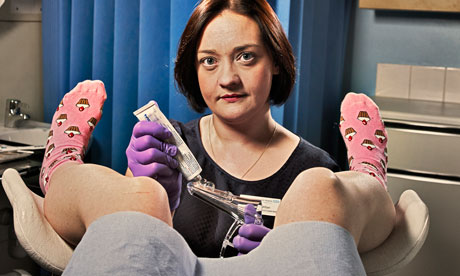
I have always agreed with Victoria Wood that I wouldn't be an adolescent again if you bumped my pocket money up to three and six. After viewing the first episode of The Hospital (Channel 4) last night, which looked at the £1bn a year efforts of the NHS to stem the rising tide of STDs within the country's teenage population, you could now bump it up to a full guinea and I would still turn it down in favour of an ageing but non-suppurating set of genitalia and a cervix that could still pass its MOT.
The nether regions of the young folk these days, it seems, are a mass of gunged-up tubes, burning nooks and pus-filled crannies, warts and weeping foreskins. Chlamydia is a rite of passage and nothing short of HIV seems to put a crimp in their sexual style. As one of the doctors noted, gone are the halcyon days when getting up the duff was all you had to worry about. "Now, in comparison, you might be quite pleased if your daughter just came home pregnant."
How does it happen? Michael explains that he goes out, "meets a random and takes it from there". The "it" in this case being herpes. He was hoping for gonorrhoea because "a pill sorts that out". Tommy advised his most recent conquest to go to the clinic, because "she needs to get herself checked out because I have had a lot of sexual partners. That's just who I am. I do drink alcohol, so what can I say?" The mother of 15-year-old Shannon sat in her flat while her daughter attended the clinic for contraception after a miscarriage, talking about her daughter's uncontrollability. But, she sighed, what could she do?
Faced with this toxic mix of teenage and parental irresponsibility – and societal, if you want to cast the accessibility of cheap alcohol in such a light – the doctors and other NHS professionals did their increasingly exhausted best. They doled out condoms, inserted implants, tracked down no-shows, persuaded the reluctant to take their tablets and maybe, just occasionally, made an infinitesimally tiny difference to the behaviour of some of the more receptive.
It was a bleak and ghastly glimpse into the world of the young. Even more depressing than the changes were the constants. Shannon explained why she went out at night when she was supposed to be in bed: "I got told that if I didn't see this boy by a particular time, he was going to dump me." Had she felt that she was ready to have sex at 15, said the interviewer, asking about her pregnancy. There was a pause. "Well," she said, her face brightening, "I loved the boy so obviously I was ready." She beamed and glowed at the memory of him. She looked about 12.
This was another excellent episode from The Hospital documentary series, which works harder than most to strip away the layers of artifice and euphemism that increasingly clutter any interaction between the public and public medicine. It did not lay bare the anger and frustration of the staff involved as much as the previous series did, perhaps because those who deal with teenagers on a daily basis are that bit closer to sainthood. They must, in order to function, simply have bigger reserves of energy and optimism to draw on than the rest of us. I'd have instituted a nationwide chastity belt programme by now and retired.
It was the turn of Rupert Everett ("actor, toff, poof", as he helpfully summarised for those unfamiliar with his work) to uncover his ancestry on last night's Who Do You Think You Are?. This was good news, because it's a format that always works best with an actor as the subject. The ego battles with empathy throughout, creating numerous little by-plays that enliven the main, dryly factual narrative – and Everett overflowed with both.
No sooner had he seen a picture of his grandfather Cyril with his handsome black steward in turn-of-the-century Nigeria than he had made him gay, and the two of them loving partners. He assumed that Cyril's father, a tattooed merchant seaman ("like a Jean Genet character!"), was a criminal fleeing the country. None of this was true, but it was fun.
He did uncover a kindred spirit: a cockney, octogenarian great-aunt, Marguerite, who shared her knowledge of his philandering great-grandfather, Frederick. She and her great-nephew bonded over a mutual love of naughty boys. "You're not playing for the other side?" she asked, light suddenly beginning to dawn. "I might be," he hedged, unsure how she would take the news. "Oh," she said. "Now I'm learning things!" They both cackled delightedly. "This is deteriorating into an Ealing comedy," said Everett. Actually, it was rather a sweet moment, one that neatly telescoped time while animating Everetts past and present.

没有评论:
发表评论